Message from the OTA's CEO

Dear DonateLife team,
Well, we’ve passed the 2022 halfway mark - and lo and behold – we're now through DonateLife Week!
There’s been so much incredible hard work and activity occurring right across the network - we’ll just have a short update today about some key activities below with the kick-off of our national awareness week to drive registrations, and you can expect more of a wrap-up in a special next edition and to share outcomes and learnings.
There’s also been lots going on in the clinical and engagement spaces since the last Network Update in June, which I’m excited to share with you below.
TSANZ Annual Scientific Meeting
From June 17-21, myself, Helen Opdam, Alison Hodak, Mark McDonald and a number of our colleagues from across the Network attended the 40th Annual Scientific Meeting of the Transplant Society of Australia and New Zealand (TSANZ) at the Adelaide Convention Centre. Similar to our Network Meeting in Sydney, it was the first chance for many people across the transplant sector to meet in person since the start of COVID-19. It was also a valuable opportunity to meet with colleagues from across the country to collaborate, strategise and share experiences.
The event kicked off with a Machine Perfusion Workshop. OTA’s National Medical Director, Associate Professor Helen Opdam, sat on the panel at the end of the workshop, which discussed the policy, legal, ethical and financial aspects of perfusion programs as they relate to Australia.
The Annual Scientific Meeting began on the Sunday and OTA’s National Manager Analytics and Technology, Mark McDonald, flew in to attend the opening, Monday’s sessions and meetings. The agenda included a wide range of presentations covering topics including living donation, organ allocation and immunology. We had a DonateLife (thanks SA DonateLife!) and OrganMatch stand set up (Thanks Narelle!) for the two days.
World Eye Bank Symposium update
On 21 July, I presented at the World Eye Bank Symposium, which focussed on ways to improve donation pathways and embed key principles of ethics and collaboration globally. The session on Goals, Frameworks and Governance was chaired by Danielle Fisher, General Manager of our NSW Organ and Tissue Donation Service and was streamed to many countries who do not have systems in place. As part of the session, I discussed how collaboration with Government leads to an increase organ and tissue donation; the set-up of our national program; and our governance structures - including having a national Eye and Tissue Advisory Committee.
Update on legislation
As you would be aware, each state and territory have differing provisions in their Human Tissue Act (HTA) that prohibit disclosure of information that may identify donors and recipients. While these provisions all have the same intent, to maintain confidentiality around donation, there are key differences in the wording that outlines on who is prohibited from disclosing information. Following recent legal advice sought by Donor Families Australia from WA, the wording in WA, NT and SA’s HTA has been interpreted to prohibit families from sharing information about their loved ones who became organ donors, though this legislation has been in place for many years without consequence.
Over the past few months, WA, NT and SA governments have been actively working to better understand the limitations of their HTA. Additionally, the ACT and the Commonwealth HTA are in the process of being amended to provide confidence and clarity around disclosure of information:
- WA: WA’s Health Minister wrote to Donor Families Australia three weeks ago to give written assurance to families that it would not be in the public interest to penalise families who publicly talk about their family member becoming an organ donor to honour and commemorate them or raise community awareness. This letter is in place whilst legislative changes are being worked through.
- SA: South Australia is still progressing in their work to review the HTA. The SA Health Minister attended the SA DonateLife Week launch with donor families and heard their stories.
- NT: The NT has received advice from the Solicitor for the Northern Territory and will be progressing amendments to the relevant legislation in the second half of 2022.
- ACT: The ACT has begun drafting amendments to their HTA with the bill scheduled to be debated in the ACT Legislative Assembly in Spring 2022.
- Commonwealth: The Organ and Tissue Authority is in the process of amending its Act to allow people to disclose information about donors without breaching state and territory HTAs.
Commonwealth Tribute to Life
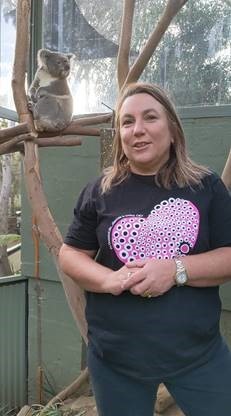
We’ve previously updated you about the Commonwealth Tribute to Life initiative led by the UK, which aims to boost levels of organ and tissue donation and transplantation around the world. Earlier this year, the Tribute to Life Project invited all Commonwealth nations to join efforts via a Memorandum of Understanding (MoU) for collaboration. The OTA signed up to the MoU in March, and there have been 17 weekly webinars in the lead up to the launch.
The ambitious target was to get all Commonwealth nations on board to coincide with the Commonwealth Games in Birmingham. There are over 40 countries who have so far signed up to participate!
Part of the official launch was to put together a video that includes short snippets of all of the participating Commonwealth countries. We wanted to shoot our part of the video in place that would easily recognisable as Australia – and what’s more Aussie than a koala? The handlers timed our visit to coincide with Matilda’s breakfast, so she’d be wide awake for the cameras!
The video is now complete and being used to promote the Commonwealth Tribute to Life project, and released as part of the official launch of the MoU collaboration
You can also view the official launch of the Tribute to Life MoU and learn more about this important work in the live stream.
DonateLife Week campaign
The national campaign for the Great Registration Race is officially still on, with activity continuing throughout August, aiming to encourage 100,000 more registrations.
The campaign launched on Sunday 3 July with TV commercials playing across WIN and Nine in prime-time slots urging Australians to ‘Ready, Set, Register’ and join the Great Registration Race for DonateLife Week. You can also see these, along with a suite of other resources on the DonateLife Week campaign website.
Keep an eye out for more media about the campaign — there's still lots of social media underway featuring our incredible donor families and organ and tissue recipients from across Australia, who have generously volunteered their time to spread the word about organ and tissue donation.
There's so much going on right now and a big thank you must go out to our comms teams in each state and territory for the work they’ve put into getting the Great Registration Race up and running.
Warm wishes,
Lucinda
OTA updates
COVID-19 Taskforce
OTA’s COVID-19 Taskforce is now meeting every second month, from monthly, and the DonateLife Leadership COVID meeting has been moved in line with this.
Organ Match progress
Organ Match has celebrated a milestone with Phase 1 of the donation portal interface completed on the 25th July! This phase required training for all DonateLife Nursing Network staff in enrolling organ donors into the portal via the EDR, and other associated procedures, decreasing duplication of work at the time of donation. This is a great achievement by all, congratulations!
VSEAC Annual report
July saw the release of the Vigilance and Surveillance Expert Advisory Committee Annual Report. The report contains analysis of serious and adverse reactions and notifications (SAERNs) within the organ donation and transplantation system. Reporting de-identified information on SAERs for shared learning is a critical component of our vigilance and surveillance system. This reporting enables clinicians working in the donation and transplantation system to contribute to the improvement in clinical practice to further enhance patient safety. Read the report.
What you told us about the DonateLife Network meeting
At the DonateLife Network Engagement Meeting in June, we worked in groups to identify our strengths and areas for improvement. Table groups were also asked to reflect on emerging trends, social behaviours or technologies that could change our environment (for better or for worse), and on further actions we can take to drive improvements in donation rates.
Thank you all for your work on this project! We have collated your feedback, which will be used to strengthen and improve our work in the future.
Here are some trends that we found in your answers:
-
An overwhelming majority of attendees chose to describe our strengths as being collaborative, passionate, willing to adapt to change, resilient, multidisciplinary, diverse, and united in a common vision. The use of evidence-based data was also mentioned several times as a strength.
-
Commonly identified areas for improvement included achieving a 100% AODR check, building trust and learning opportunities between areas of expertise, greater collaboration between the donation and transplant sectors, a more standardised national approach to strategies and guidelines, greater capabilities in navigating cultural sensitivities, and greater attention to staff wellbeing and fatigue management.
Read the full list of collated responses, including your suggestions of emerging trends, social behaviours, and technologies that might affect the network, and recommended further actions.
We look forward to being able to bring the DonateLife Network together again in 2023 at the Donation and Transplantation Conference, scheduled for 2-3 May 2023 in Melbourne (more information coming soon).
Year to date data – January to June
Donation outcomes are up slightly from 2021 but the number of transplant recipients has decreased slightly.
-
214 deceased donors for Jan-Jun, a 3% increase on 2021 YTD (207)
-
585 transplant recipients for Jan-Jun, a 1% decrease on 2021 YTD (588)
The DonateLife Audit data to the end of April show a national consent rate of 56%, the same as in 2021. Other key metrics include:
-
80% overall referral rate, down slightly from 81% in 2021
-
92% AODR checking before a staff raised FDC, up 1% on 2021
-
81% of staff raised discussions involved a Donation Specialist Nurse, up from 77% in 2021
New COVID-19 stats from the data team
The number of reported COVID-19 cases across Australia is increasing again as can be seen below, although not as sharply as the initial Omicron surge in January:
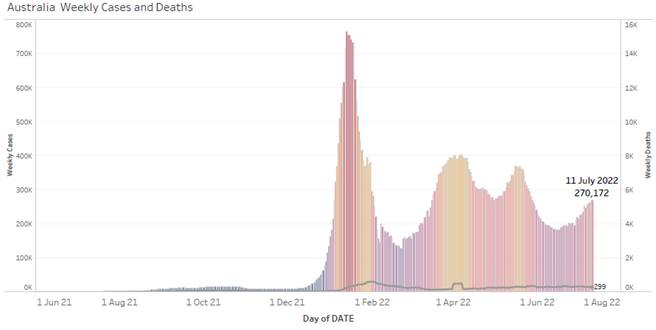
The increase in case numbers is being matched by an increase in hospitalised cases, with almost 3,500 patients currently hospitalised with COVID-19:
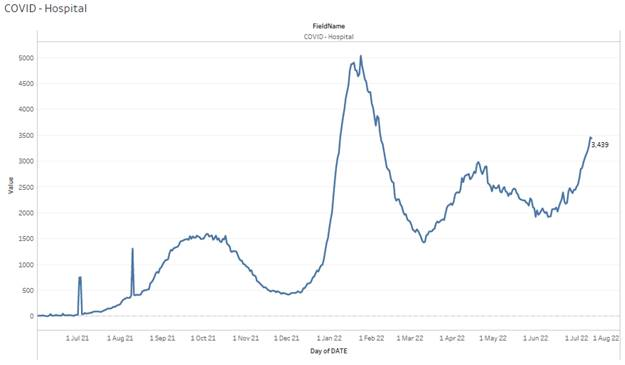
In intensive care units there has been a slight increase in cases but numbers are still much lower than the peaks of the Delta and initial Omicron waves, particularly in NSW (blue line) and Victoria (orange):
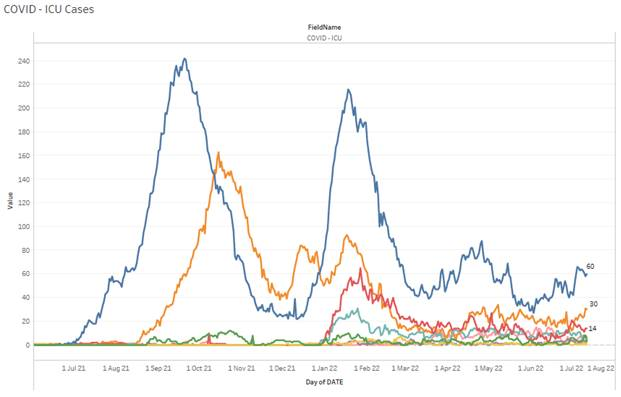
This trend is also reflected in the data from the UK where case numbers and hospitalisations are increasing but there has been limited impact in the intensive care environment to this point.
Donor - Recipient correspondence filming
During June, we filmed an educational resource for transplant recipients on donor and recipient correspondence guidelines.
The film includes interviews with a donor family, transplant recipient and transplant coordinator. The resource will be played in transplant clinic waiting rooms and transplant clinics and will soon also be available on the DonateLife website and other relevant stakeholder websites.
pFDC workshop facilitator refresher
It was great to see most of the pFDC facilitators at the OTA office on 28 June. Bernie Dwyer and Steve Philpot led the team in refresher training on the pFDC course.
Welcome also to Josephine Reoch from Donatelife QLD who has joined the pFDC team.
Clinical Team member joining OTA
Kirstie Owen, DSC from WA, was successful in obtaining the 0.6FTE 1-year clinical position on the OTA Clinical Programs team. Kirstie will be working on a wide range of clinical projects including SOPS and guidelines reviews and providing current clinical advice to the Clinical Programs team.
Congratulations Kirstie and welcome to the team!
Community engagement updates
NAIDOC Week
This year, NAIDOC Week (3-10 July) coincided with DonateLife Week, so we planned a number of activities across the Network to celebrate. You can read more about the launch of resources for First Nations communities in the Queensland and WA updates below.
Alongside the sharing of some media stories during NAIDOC Week, the OTA launched a moving new podcast from Sam Thaiday (ex-NRL player and legend) about organ donation, with support from our 2022 Community Awareness Grant recipient, Podshape.
Through Sam, who is a proud Torres Strait Islander man with a huge community following, we sought to reach and encourage more First Nations Australians, and young males in particular, to register as organ donors and to spark the conversation with their families about donation.
In the first episode of the podcast, Sam interviews Maddi Sivyer, an Olkola Teppathiggi woman from Cairns, who received a liver transplant as a child. There are a total of six episodes in the series, all released in July, and all incredibly moving and worth tuning in to. listen to the full podcast, aptly called ‘A Gift Worth Giving’.
Network news
DonateLife NSW
A number of new staff have recently joined the NSW network. A big welcome to the following new starters!
Donation Specialist Nurses
-
Cydne Williams – Prince of Wales Hospital
-
Melinda Paraggio – South West Sydney Local Health District (LHD)
-
Louise Umbers – Hunter New England LHD
-
Patrick Regan – Mid North Coast LHD
-
Howard Clare – North Coast LHD
-
Shevaun Walker – St Vincent’s Hospital
-
Grace Turnbull – Northern Sydney LHD
Donation Specialist Coordinators
-
Christian van Reede
-
Marilina (Trina) Ripoll
-
Blair Montgomery
MRFF update
BIENCO’s Phase 2 application for a further five years’ Medical Research Future Fund funding was submitted 14 June 2022. It was a genuine team effort to compile such a large body of work. The application was laden with the team’s collective expertise and learnings, projecting a roadmap of the activities, methods and partnerships required to transform the suite of bioengineered tissue products from concept to reality. This Research Plan has been the team’s raison d’etre for the past year, and it is an absolute credit to BIENCO as a powerhouse of collaboration with consortium partners: the University of Sydney, University of Wollongong, University of Melbourne, Queensland University of Technology, the Centre for Eye Research Australian and the NSW Organ & Tissue Donation Service.
DonateLife NT
During June, several previously separately held events, including the City to Surf running events, the former Mitchell Street mile and a cycling criterium were amalgamated and held over one weekend as part of the Darwin City to Surf Festival. DonateLife NT agreed to sponsor and receive naming rights to the 4km run, and also received naming rights to the women’s mile event. A full page DonateLife colour advertisement featured in the festival’s event booklet.
On Saturday 25 June, the mile events and cycling criterium were held along the Esplanade in Darwin city. DonateLife set up a stall on the Esplanade parkland and talked to various members of the public to provide information on organ and tissue donation, dispel myths and offer merchandise. DonateLife banners were also on display along the course and DonateLife was promoted over the speakers.
On Sunday 26 June, over 1000 participants, both adults and children, participated in the City to Surf running events and many more cheered from the sidelines. DonateLife NT staff, their family members and hospital staff participated in the 12km and 4km events (Leigh, the on-call donation nurse, even ran with his on-call phone). DonateLife was promoted over the speakers at the start of the 4km race and once again DonateLife banners were on display near the finish line.
Although participation was reduced compared to pre-COVID 19 years, this still provided an opportunity (rare in the past few years) to interact with members of the public and raise awareness.
DonateLife WA
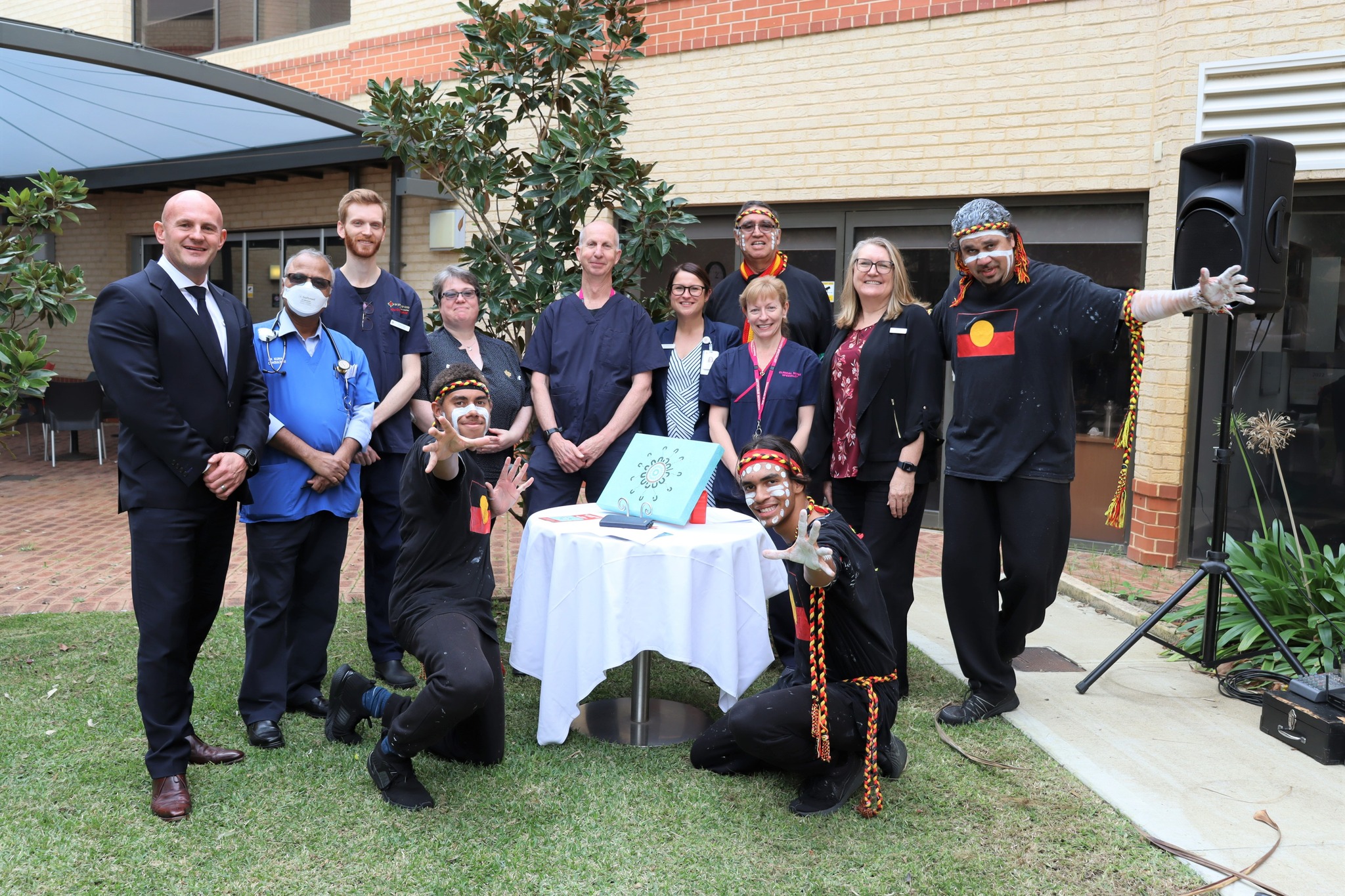
DonateLife WA has been continuing services despite the significant impact of COVID-19 on staffing numbers across Health Service Providers. These services include providing support to families while the Donor Family Support position is vacant.
DonateLife WA’s Aboriginal Resources are also now complete!
The Aboriginal artwork commissioned for use in a suite of Aboriginal resources will be launched in the coming months, and a copy of the commissioned artwork in the form of plaques will be presented to ICUs across the Health Service Providers.
DonateLife VIC
Our Education Team recently farewelled Jo-Ann Rihs, however, we are pleased to advise that Monique Drury has moved from her DSNC position at Western Health into our Education Team until June 2023. We recently advertised for our next intake of DSNCs and also for an Education Team Lead role, which we look forward to announcing soon.

DonateLife Week was in full swing last week, with our mini campaign with Emergency Management Victoria kicking off involving Emergency Services Commissioner Andrew Crisp sponsoring a race between the Victorian emergency services to see who can get the most registrations. We’ve also seen thousands of people engage with our stories shared on Humans of Melbourne and Melbourne I Love You social media pages.
DonateLife QLD
NAIDOC Week
DonateLife Queensland officially launched some co-designed communications resources for First Nations communities during NAIDOC Week. The pilot package of video resources and an educational flipbook was launched in Cairns in far north Queensland on Friday 8 July during ‘Friday in the Park’.
Cairns Donation Specialist Nurse Loren Ginders has been instrumental during the community consultation phase of developing the resources. She was invited on stage at the NAIDOC Week celebrations with some First Nations transplant recipients to outline the project and provide some deeper awareness about the organ donation and transplantation process and its relevance to the high rate of kidney disease in First Nations peoples.
The resources will be further refined and localised into different Queensland communities, engaging ‘champions’ in each local area and featuring local artists and transplant recipients as well as donor families who are willing to share their experience. The videos, which have been created in a short format for social media sharing, and a longer format for in-person presentations, will be uploaded to the DonateLife website shortly. The launch attracted local television, radio and print media.
Knee for Ackers
DonateLife Queensland also recently supported ’Knee for Ackers’, an annual event held by the Ackerman family in honour of their talented rugby loving son James, who donated his organs and tissue in 2015. Sunshine Coast and Gympie Rugby supported Knee for Ackers this year, with five clubs taking part on Saturday 18 June. DonateLife held a marquee at the Caloundra team event and was overwhelmed by support from the club members, with all teams coming up to register and show their support for organ and tissue donation.
DonateLife TAS
Organ and tissue donation protocol
DonateLife Tasmania has recently achieved a milestone for donation practice within its Tasmanian Health Service with the state-wide endorsement of its first organ and tissue donation protocol in all Tasmanian donation hospitals. This protocol has been supported by all ICU and ED key stakeholders to progress organ and tissue donation at end of life.
After 12 years since the establishment of organ donation services in Tasmania the protocol has captured Tasmanian clinical practice and aims to bring visibility to the work the team has progressed since commencing in 2010. It will continue to strengthen donation practice that is in line with best and evidence-based practice in each of the Tasmanian hospitals.
Importantly, this protocol supports the criteria of the Australian Commission on Safety and Quality in Health Care National Safety and Quality Health Service Standards, specifically:
-
Standard 2 - Partnering with Consumers – in exploring and sharing registered donation wishesand supporting informed family decisions of those in our Tasmanian community.
-
Standard 5 - Comprehensive care at the end of life - consistent with the National Consensus statement: essential elements for safe and high quality in end-of-life care – which recommends that end of life discussions should routinely explore organ and tissue donation.
The Tasmanian team will now be formally implementing the protocol with an intensive period of education, information sharing, and delivery of tools including EOL triggers to support routine referral/notification.
Physiological Management of the Adult Potential Organ Donor Guideline
Another key guideline which has been a part of a DonateLife Tasmania quality improvement activity has also been supported and endorsed in all Tasmanian donation hospitals. The state-wide Physiological Management of the Adult Potential Organ Donor Guideline supports the coordinated and shared approach to physiological management of the organ donor between clinicians in the ICU, medical and nursing donation specialists, and transplant physicians, with an aim to optimise organ function for transplantation and maximise the number of transplantable organs.
This guideline includes a bedside Clinical Care Tool, and together these documents provide coordinated care guidelines to guide the physiological management of potential organ donor patients and support all clinicians to have access to standardised clinical management strategies, documented specific physiological aims and escalation plans.
DonateLife Tasmania is excited to be sharing these documents and is proud of the quality improvement work and focus that the team have done to achieve this important work.
Do you have news to share?
This email is a small snapshot of news from the DL Network. If you have an update to share, get in touch with your state or territory communications rep or email the OTA communications team.
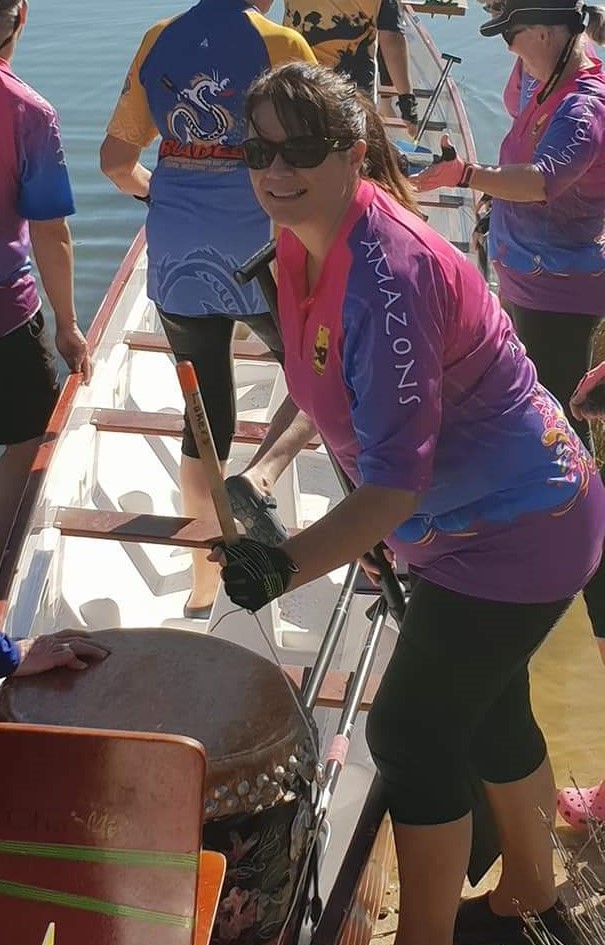
What’s your role in the DonateLife Network?
Clinical Nurse Specialist – Organ and Tissue Donation.
What does your role include?
Education, Audit, CPIP.
What led you to your career?
23 years in ICU – always invested in end-of life care and organ donation.
What was your first job?
Picking kiwi fruit in Opotiki.
Are you an early bird or a night owl?
Night Owl.
Are you a dog person or a cat person (or neither)?
Cat.
If you could choose a superpower, what would it be?
Time travel through the multi verse.
If you could only have three apps on your smartphone, which would you pick?
Travel App, banking app to pay for travel, and a messenger app with family group.
What’s your favourite sport to watch and which team do you barrack for?
Dragon Boating - Amazons Perth.
What’s one hobby you’d love to get into?
Yoga.
What’s the top destination on your must-visit list?
Antarctica.
What’s your go-to karaoke song?
Dancing Queen.
These updates are distributed to DonateLife staff across Australia, via the contact details within the DonateLife Learning Site. To update this distribution list, please speak to the education coordinator in your jurisdiction. We thank you for not sharing this update with anyone outside of the network.
